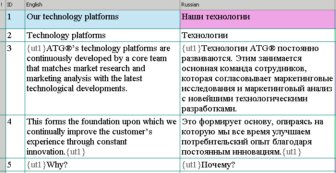|
English to Russian Translation The English to Russian translation practice proves that any English text can be adequately translated into Russian. It means that thoughts and ideas will be conveyed sufficiently.
The English to Russian translation practice proves that any English text can be adequately translated into Russian. It means that thoughts and ideas will be conveyed sufficiently.However, the sentence structure will be changed in most cases. The point is that grammatical systems of English and Russian languages differ considerably. In Russian, relations between words are determined by grammatical endings, and a word-order doesn’t play a large role. For example:Каждое достижение, даже самое малое, ручательством служит достижений больших. («Грани Агни Йоги») Ручательством служит достижений больших каждое достижение, даже самое малое.Changing the word-order does not result in the fundamental change of the meaning of the sentence because grammatical endings point out to a function performed by a word irrespective of its place in the sentence. The situation is different in the English language. English almost does not have grammatical endings, and one of the main tools of identification of a syntactic function of a word is the place of the latter in a sentence. Therefore, the English language is characterized by a fixed word-order with the following main disposition: subject, predicate, and object. For example: Water contains about 90% of oxygen. Changing the word-order will result in the fundamental change of the meaning of the sentence: Oxygen contains about 90% of water. Therefore in English to Russian translation, an English sentence should be translated not voluntarily, but starting from the definition of the main parts of the sentence -- subject and predicate -- which contain the main idea. Since English and Russian languages differ substantially in their syntactic structure, it often turns out to be impossible to retain the wording of the original in English to Russian translation. Moreover, for the sake of accurate conveying of the meaning, it may be necessary to modify the structure of the sentence, which is being translated, in accordance with standards of the Russian language, i.e. to change the words over or even to replace individual words and expressions. Let us take for illustration an example of English to Russian translation of a title of a known movie: Gone With the Wind – «Унесённые ветром». From the point of view of the form, this translation has deviated from the English original; however, it accurately conveys the title’s emotional content, which would be lost in case of the word-for-word translation: «Ушедшее с ветром». Thus, we see that the accurate conveying of the meaning of the original in the process of English to Russian translation quite often requires departing from verbatim translation and from the attempt to retain the form of the original. So, in case of need, a translator not only may, but must change over parts of a sentence and use a word-order more natural for the Russian language. For example: Oliver Twist’s ninth birthday found him a pale thin child, somewhat diminutive in stature, and decidely small in circumference. (Charles Dickens. "Oliver Twist") More resources on English and Russian languages, including dictionaries, language schools, online courses, and English to Russian translation services can be found at Search Language, a specialized language resources directory. In addition, you can find there information related to many other languages. Didn't find what you were looking for? Use this search feature to find it. Back to Russian Translator Page Return from English to Russian Translation Page to Home Page
_____________________________________________________________________ Website owner: Irina Lychak, self-employed freelance linguist, Russian translator, Ukrainian translator, Kiev (Kyiv), Ukraine |
Almost everyone would like to quit their day job, or work from home, or needs extra money. What if you could build for yourself an online business that could give a full-time income... With Site Build It! this dream can become a reality. I do not offer you another get-rich-quick scheme. I am talking about a complete and proven step-by-step process that will require your time and work. But it is a doable process that has given many people a new income and a shot at a new life. Here's some people who are doing it. Site Build It! is more than just hosting or site-building. It provides all the tools you need for getting traffic, sending out e-mails, adding a blog, and monetizing your site. And you don't have to be a techie to use it. Want to learn more? Take the Video Tour. It will show you what I mean. Invest the most Click, sit back, and The process works! I know because I've done it myself. You are reading now my site built with the help of Site Build It! tools. Two years ago I have jumped at the opportunity to turn my dreams to reality and have never regretted that decision. What stops you? You can give yourself this opportunity too! Site Build It! offers a No-Risk Money-Back Success Guarantee that means you have nothing to lose. |








